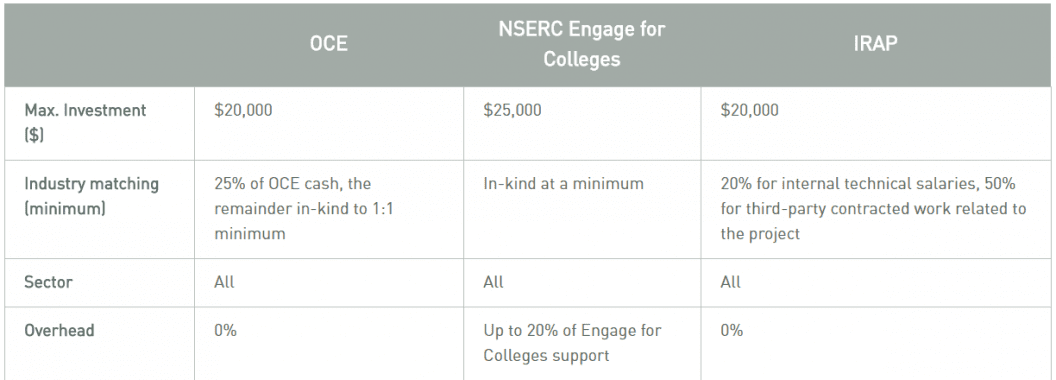Colleges Applied Research and Development Fund (CARDF): Ontario SMEs

The Colleges Applied Research and Development Fund (CARDF) is a $20-million Ontario government funding program designed to support the collaboration of college researchers with industry partners. Through the program, Ontario-based businesses will be able to submit their innovation challenges and work with college researchers and faculty to develop a market-ready solution.
There are three streams of funding to deliver CARDF small business funding, including one stream offering Ontario government grants and the other two awarding vouchers. Through all streams, awarded funds will be directly applied to performing research at an accredited Ontario college. In most cases, industry collaborators will be able to leverage 1:1 support for their investment.
One of the program’s streams also supports ‘stacking’ with IRAP ARP and NSERC Engage grants. Leveraging multiple funds through this approach can significantly improve project financing.
Performing research at an Ontario college can provide a range of benefits to innovative companies. Colleges can help businesses overcome internal technical challenges by applying practical, easy-to-implement solutions that are time and cost-efficient. Involving academic researchers will also help to train Ontario’s next generation of skilled workers and can gradually reduce your organization’s talent gap.
Colleges Applied Research and Development Fund (CARDF): Funding Streams
There are three unique streams of funding offered through CARDF. Each has a specific purpose, set of eligibility criteria, and application process. Although each require businesses to form a partnership with an Ontario college, the programs operate quite differently:
1. College Strategic Sector/Cluster/Technology Platform (CSSCTP)
In this stream, Ontario colleges and industry associations, consortia, or other groups of businesses may partner to build capacity for innovation in strategic sectors and/or technology areas. By leveraging the expertise and resources available at the college, the program will accelerate applied research and development plans.
Colleges will analyze the cluster of businesses who’ve applied and construct a portfolio of R&D projects that can drive industry or technology improvements. This actionable plan can then be applied by the cluster as seen fit.
- Funding Contribution: Grants worth up to $250k-$1M will be awarded to the research college(s). Business clusters must provide matching support equalling the value awarded by OCE, however only 25% of this contribution is needed in cash while the other 75% can be provided in-kind.
- Eligibility: Must have a manufacturing and/or research and development presence in Ontario and have the capacity to commercialize or implement the results of the project.
- Deadline: First stage of a 2-part application process due April 13, 2017.
2. College Voucher for Technology Adoption (CVTA)
Through the CVTA program, companies will be able to access student teams guided by college faculty. These work groups will act as consultants and apply their skills to solve business challenges related to technology development and testing/validation. Through this program, it’s expected that innovations will move towards commercialization readiness.
Ontario businesses will be able to access college laboratories and teams of skilled researchers who can perform experimental design, testing, data collection and processing, and a variety of other tasks.
- Funding Contribution: Vouchers are awarded by OCE to Ontario colleges who can use them to offset up to 50% of eligible research and development costs. Business contributions can be paid as cash or in-kind.
- Eligibility: Must include at least one for-profit partner located in Ontario who has the capacity to implement/commercialize project results.
- Deadline: First stage of a 2-part application process due March 21, 2017.
3. College Voucher for Innovation and Productivity (VIP)
The CARDF VIP program provides significant financial support for research and development projects where teams of college students are used. Through the program, companies will be able to breakthrough internal technical barriers to develop, implement and commercialize new products/processes.
VIP projects will be able to stack multiple sources of funding to provide additional project funding. VIP vouchers will be able to stack with eligible IRAP ARP or NSERC Engage projects to extend R&D project budgets.
There are two sub-streams included in the Voucher for Innovation and Productivity (VIP) program. These are classified by OCE as programs VIP I, and VIP II:
VIP I – Projects up to 12 months in duration.
VIP II – Projects from 12-24 months in duration.
- Funding Contribution: OCE vouchers can offset up to 50% of eligible research and development costs to a maximum $20,000. Business contributions can be paid as 25% in cash while the other 75% can be provided in-kind.
- Eligibility: For-profit with a manufacturing and/or research and development presence in Ontario and have the capacity to commercialize or implement the results of the project. Must have at least two full-time employees and have been in operation for at least 2 years. If applying for IRAP or NSERC funding, additional criteria may apply.
- Deadline: Continuous intake of applications.
Stacking CARDF VIP Research Funding with IRAP and NSERC Grants
There are many research organizations in Canada that are responsible for awarding government grants, loans, and vouchers. CARDF’s VIP funding stream provides a critical pathway for businesses to secure federal grants to stack with Ontario provincial funding; this leverages as many grants and incentives as possible to offset R&D project costs.
Provided that a business receives a full $20,000 in vouchers from CARDF for their VIP I project, additional funding could be acquired through IRAP ARP and NSERC Engage as follows:

(Image Source: Ontario Centres of Excellence)
How to Apply for the Colleges Applied Research and Development Fund (CARDF)
Two of CARDF’s streams have upcoming deadlines where applicants must submit an Expression of Interest (EOI) that outlines their technology project and/or partnership. This includes:
- College Strategic Sector/Cluster/Technology Platform (CSSCTP): April 13, 2017
- College Voucher for Technology Adoption (CVTA): March 21, 2017
Each stream’s application process, including documentation required for submission, is unique, therefore potential applicants should discuss their project and timelines with a Mentor Works Government Funding Planner™
Please contact Mentor Works to develop a government funding plan for your innovative research and development project.

